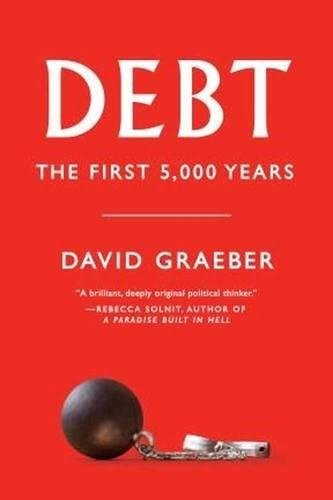Like it, would like some more
4 stars
It can be dense or dry, but I enjoy the history of world economies and what Graeber had to say about bartering and Adam Smith.

544 pages
English language
Published Nov. 27, 2012
The author shows that before there was money, there was debt. For 5,000 years humans have lived in societies divided into debtors and creditors. For 5,000 years debt and debt forgiveness have been at the center of political debates, laws and religions. The words “guilt,” “sin,” and “redemption” come from ancient debates about debt. These terms and the ideas of debt shape our most basic ideas of right and wrong. source
It can be dense or dry, but I enjoy the history of world economies and what Graeber had to say about bartering and Adam Smith.
I read Debt right after The Dawn of Everything (also by Graeber), and my opinion of these two books is closely interlinked. The combination is an extensive unwinding of the sort of economic and social history I learned in school. I've had to re-imagine the ways that humanity developed our relationship with agriculture, with technology, and with the interplay of social obligations which we now categorize as money and economics.
The core insight and question isn't any of those individual revelations. What Graeber is trying to get you to think about is the stickiness of contemporary social relationships & structures, and the ways that we have lost the ability to imagine the possibility of change. No economic or political system has ever been as committed as ours is to narrowing the realms of the possible and foreclosing the ability to imagine other ways of organizing society. Historically, social dynamics have …
I read Debt right after The Dawn of Everything (also by Graeber), and my opinion of these two books is closely interlinked. The combination is an extensive unwinding of the sort of economic and social history I learned in school. I've had to re-imagine the ways that humanity developed our relationship with agriculture, with technology, and with the interplay of social obligations which we now categorize as money and economics.
The core insight and question isn't any of those individual revelations. What Graeber is trying to get you to think about is the stickiness of contemporary social relationships & structures, and the ways that we have lost the ability to imagine the possibility of change. No economic or political system has ever been as committed as ours is to narrowing the realms of the possible and foreclosing the ability to imagine other ways of organizing society. Historically, social dynamics have been much more fluid, with a significantly greater ability for groups to deliberately redefine the parameters of their politics, or simply to walk away from situations which no longer serve their needs.
In this sense, I'm reminded of Le Guin's famous statement that:
“We live in capitalism. Its power seems inescapable. So did the divine right of kings. Any human power can be resisted and changed by human beings. Resistance and change often begin in art, and very often in our art, the art of words.”
In fact, Le Guin was underselling the case! The divine right of kings was a relatively short-lived novelty as a political system, which many people routinely walked away from, and which suffered umpteen disruptions and overthrows. Our contemporary political systems are at once more brittle than monarchy, and more intent and effective than any before seen at punishing defiance and making other systems seem impossible. I cannot imagine a society which aspires to total surveillance and imprisons so much of its population being anything less than terrified about the possibilities of change and people's ability to manifest that.
Truly an eye-opening pair of reads which I highly recommend.